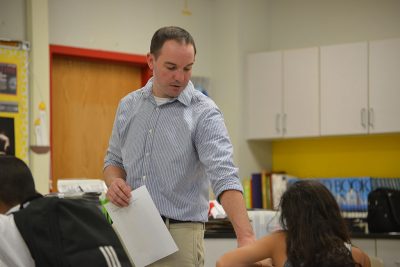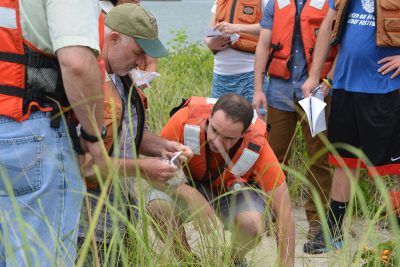
In our recurring 10 Questions series, the Neag School catches up with students, alumni, faculty, and others throughout the year to offer a glimpse into their Neag School experience and their current career, research, or community activities.
Michael Forsyth ’15 (CLAS), ’16 MA, a native of Floyds Knobs, Ind., had already served in the U.S. Navy aboard two submarines and started a family when he decided in his late 20s to work toward a college degree. After completing his undergraduate degree in mathematics at UConn in 2015, Forsyth went on to earn his master’s degree in curriculum and instruction through the 11-month Teacher Certification Program for College Graduates (TCPCG) at the Neag School of Education. He has since been finding creative ways to teach math to students at Connecticut River Academy in East Hartford, Conn.
Interested in becoming a teacher in less than one year? This fall, TCPCG info sessions begin Sept. 11. Learn more at s.uconn.edu/teach.
You followed a nontraditional path to UConn. When did you enroll? I was 29 when I enrolled in UConn as a transfer student after spending two years at Three Rivers Community College. I was married for six years at that point and had a son and daughter.
What was your professional work experience before applying for TCPCG? I enlisted in the Navy March 2006 when I was 21. I had failed out of college my first time around for various reasons, was working full time for minimum wage, and needed to change my course in life. I went to submarine school for about 10 months and was stationed on two different submarines for the remaining four years and two months. Submarine life is something I will never forget. Overall, I really did not enjoy it. Something about not seeing daylight for two months at a time while deployed, no communication with the outside world other than email, the real possibility that there could be an accident and we would sink to the bottom of the ocean, et cetera … I say that I did not enjoy it, but it is something that I am proud of.
Why did you decide to pursue a career in teaching? I wanted to work with people. My grandfather told me when I was younger, he wished he had pursued teaching for a career. He said I should do that because I am the type of person who people listen to when I speak. I also taught/mentored some of the younger sailors a little bit about sonar in the Navy and enjoyed that. I just thought teaching was calling me in some way.
I was initially accepted into UConn’s [undergraduate] mechanical engineering program. I took engineering courses my first semester, then reflected on what I wanted to do moving forward and decided that I wanted to teach. I changed my major to math after my first semester with the goal to be a math teacher. I don’t regret that decision. TCPCG, the [master’s] program offered through UConn, seemed like the best program to prepare me for teaching students and navigating the profession to maximize my potential, outside of the math.
What was most valuable about TCPCG in preparing you to become a teacher? The relationships and conversations with the instructors. They were all passionate about what they knew and their experiences, and wanted to prepare us the best way possible. Just having someone tell us that teaching has more to do with the relationships you build with students and how you get them to engage in learning than what I know about math was something that I did not expect and that was valuable to me as an early teacher.
“You have to be willing to let your inner math geek out for everyone to see, each day. When I show the students my passion for math, they are more willing to try to meet me there.”
— Michael Forsyth ’15 (CLAS), ’16 MA
What grade(s) do you teach at CT River Academy? I have taught [Grades] 9 to 12 in my three years at CTRA. I have taught algebra I, algebra II, and math of finance (a senior elective). Algebra II is my favorite class to teach because we start to get away from the answer is “2” to more conceptual understandings. It is a course where the students are able to develop their math thinking and have depth in their conversations about mathematical situations.
What sorts of things, from your perspective, are important for aspiring math teachers to know about teaching math in an effective and engaging way? You have to be willing to let your inner math geek out for everyone to see, each day. When I show the students my passion for math, they are more willing to try to meet me there.
It can’t just be me showing them how to do math problems; the students need to be doing the work and making mistakes, and trying again and again. Then when they have it, give them the same concept to think about in a different way.
I believe there has to be a mix of learning that happens. It can’t all be project-based learning in math because there are computations that have to be made, and students need prior knowledge to complete projects. It can’t be all drills either, because the students will burn out. But there are times when I need them to see patterns and come to a final answer. I will have them quizzing each other to find an answer with flashcards that they exchange or individual whiteboards they carry around the room. I try to do that in a way where they are moving around the room to work with everyone, rather than sitting and going through a worksheet.

What kinds of activities or special projects do you lead in the classroom to engage students in learning math? An example of a project I found effective and had the students engaged was called “Barbie Bungee.” The students were put into groups of three and had to find a linear regression equation from a scatter plot they created by dropping a Barbie from a set height and measuring the distance the Barbie fell after tying rubber bands together to make a longer bungee cord.
Once the students found their respective linear equations with their variables being the distance of their Barbie’s fall and the number of rubber bands tied to Barbie’s feet, they made predictions, wrote about their math thinking, explained their reasoning, and finally tested their predictions by throwing Barbie from CTRA’s second floor balcony to the first floor below with the goal being to get Barbie as close to the ground as possible without killing her. I thought it was awesome.
Is there anything you did on the submarines that could apply to work in a math classroom? Absolutely! I was part of the sonar division. I would listen around the submarine to sound, and use sound to paint a picture of what was happening around the submarine. Think of it like this: We have no eyes (no windows), just ears, and our ears are our eyes to navigate the sub. Kind of crazy, but there was some real math that I had to use in order to learn sonar.
What has surprised you the most about teaching? How tired I am at the end of the day. I was in the Navy and did a good amount of physical labor on some days — and it does not compare to teaching. I put my heart into my lesson plans, improving each day, building positive relationships, collaborating with colleagues, et cetera. There are days that I would say are failures. A student cusses me out, a student I have been trying to work with will do something stupid and get suspended, the lessons I planned fall flat, the students fight me and won’t engage in their learning for the day. Then there are days that I leave work feeling like I have made a difference in a young person’s life.
The best experience I had was last year. There is this girl who struggles in math. She is working on a problem set, and I check in with her. She has tears on her face and my first thought is, ‘What happened?’ So I quietly ask her to step in the hall, and she says she doesn’t need to. She looks up from her completed problem set and said, ‘I get it. I never get it.’ I just told her that I was proud of how hard she had worked in my class all year. She came up to me at the end of the class and said thank you for being so patient and not giving up on her. Those are the days that surprise me the most, where I feel the most alive and connected with humanity. I am able and do help others.
What advice would you give to someone considering a career in teaching? Treat each day like a fresh start. Try to be as authentic as possible. Find your comfort zone and go with it. When you find what makes teaching work for you, you are then able to improve yourself and your teaching each day.
Read other installments of the 10 Questions series.
If you have a college degree and would like to explore the possibility of becoming a teacher in less than one year, be sure to attend an upcoming information session for the Teacher Certification Program for College Graduates. Learn more at s.uconn.edu/teach.
 Facebook
Facebook
 Twitter
Twitter
 LinkedIn
LinkedIn
